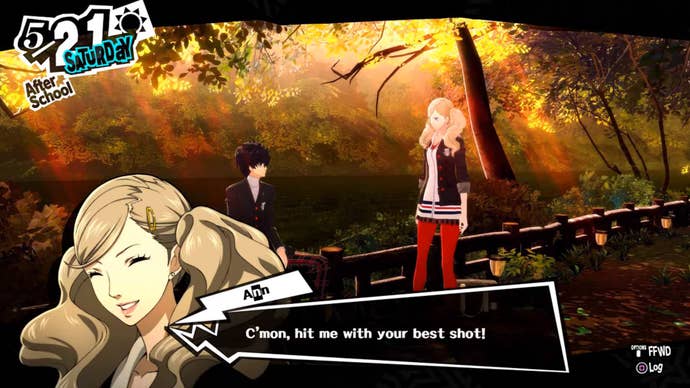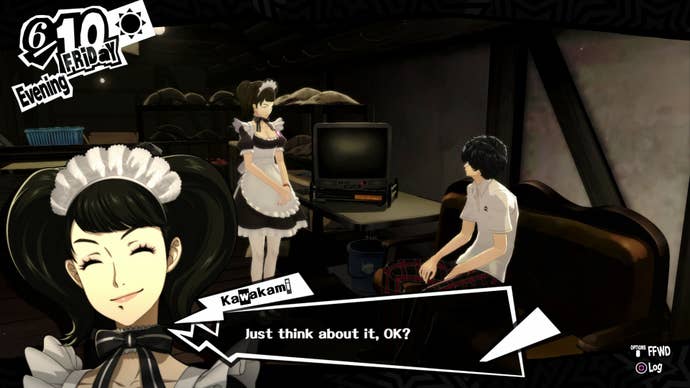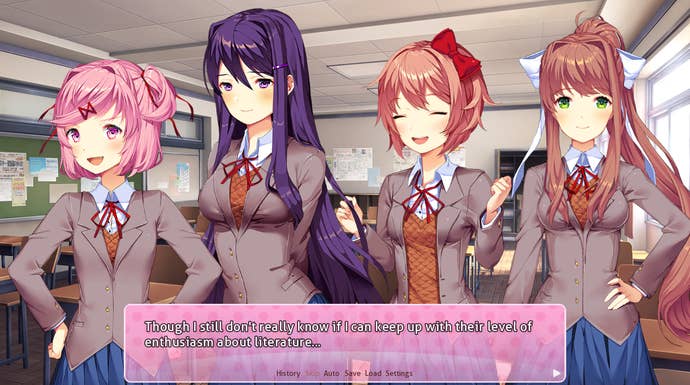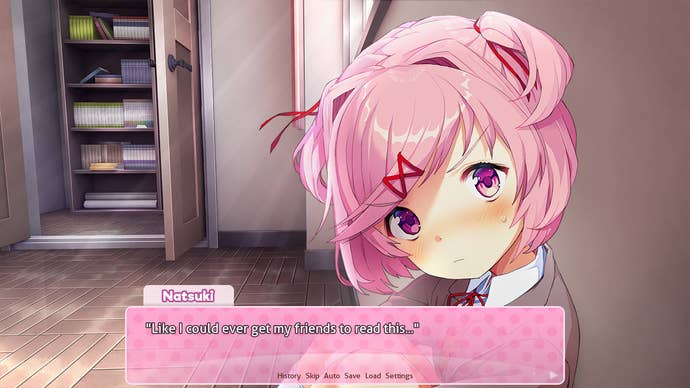How Games Mess up Romance
With Mass Effect, Persona 5, and Doki Doki Literature Club, games teach us troubling things about love.
This article first appeared on USgamer, a partner publication of VG247. Some content, such as this article, has been migrated to VG247 for posterity after USgamer's closure - but it has not been edited or further vetted by the VG247 team.
Warning: Spoilers for Doki Doki Literature Club and Persona 5 follow.

When gamers talk about escapism, the first thing that usually comes to mind is open-world action-adventure chaos, the kind commonly found in Grand Theft Auto 5 or Fallout 4. Go wherever, kill whoever, blow up as much stuff as you want. The world is yours, so it’s time to mess things up for a bit before going to bed for the night.
But escapism isn’t just about killing as many police officers as possible and then hiding away in a beat-up sedan. It’s also about escaping from everyday life with fictional characters. Just as much as readers, gamers love a good story. And these days, romance is more immersive than it has ever been before in gaming.
Series like Mass Effect and Persona feature extensive romantic options for players to choose from, and more often than not, their storylines are pretty complex. Want to date an alien? Go for it. Hook up with your homeroom teacher who also works as a maid? Why not. And more genres are tackling romantic plotlines, too. Even psychological horror games are joining in on the fun, like last year's surprise hit Doki Doki Literature Club.
But as romantic options continue to grow in gaming, the way we think about love and romance in mass media is still just as troubled as ever. And when romantic plotlines in video gaming prey on the unrealistic expectations we have about dating, then they do a disservice to anyone who ever wanted to build a healthy romantic relationship.

It’s Not You, It’s Your Game Design
When it comes to BioWare’s Mass Effect trilogy, the game’s developers created a foolproof solution to building romantic relationships: Actively seek out your love interest, particularly at opportune moments, and always respond positively.
Larisa Garski, a therapist who specializes in narrative theory and couple therapy, thinks Mass Effect focuses heavily on positive interactions because the game's main characters are constantly facing a life-or-death situation through the villainous Reaper’s threat to the galaxy. But in reality, couples new and old have to face negative circumstances in order to grow as people. And saying the right things at the right time doesn’t necessarily lead to sex.
"As we all know, a romance doesn't just grow from positive interactions,” Garski tells me. “There must be negative interactions that challenge the couple or prospective couple to grow and see both themselves and each other in new ways."
Instead, Mass Effect depicts romance as something that the player can “win” by searching for guides and inputting the right responses when required. Sex is treated as just a reward, games journalist and developer Emma Kidwell tells me, which breaks the immersion. Kidwell has written extensively about Mass Effect’s romantic plotlines in the past for Polygon by ranking them from worst to best. But even in Mass Effect’s best romantic storylines, the unrealistic messages the series sends about sex still stand out.
"Explicit consent is never really shared, if I'm remembering correctly, in the first three games,” Kidwell says. “It's basically everyone is always OK with kissing Shepard as long as she presses the right response.”
When games focus so heavily on positive interactions that they forget about the building blocks behind a romantic relationship, then they downplay the complex themes and messages that romantic storylines can tell. For Garski, Mass Effect’s original trilogy starts out as if every single character has “raging hormones all the time," and slowly shifts into "adult relationships" that feel nuanced and complex.
“One of the things I think [BioWare] did well in later games–not just in Mass Effect 3 but in Dragon Age 3–is that once you had successfully romanced a character you could engage in more negative interactions if you so chose,” Garski says. “You could challenge them sometimes to negative effect. Which I loved.”

Breaking Immersion
But it’s not just society’s larger baggage about romantic relationships that impacts gaming’s stories. It’s also how romantic storylines play out in relation to other moments within a game.
In Persona 5, the player has the opportunity to romance Sadayo Kawakami, the protagonist’s homeroom teacher, after he calls up an adult maid service and finds out that his teacher moonlights as a sex worker. This opens up Kawakami to a larger game design system called “Confidants,” which lets players build close relationships with other characters in exchange for in-game perks.
As the protagonist’s Confidant rank with Kawakami grows, their relationship can take on an intimate tone. It’s even implied that Kawakami stays the night with him on Valentine’s Day. And maxing out her Confidant lets the player receive a “special massage” from her too, whenever they want. In exchange for her services, this lets the player do more activities after prowling the game’s dungeon roaming section during the day, as usually the protagonist is so tired they go straight to bed.
Georgina Young, a games journalist who lives in Japan, says Persona 5 "certainly bends the rules" with some of its romantic relationships. For one, she can't see the game's various adult women actually hooking up with the teenage player character. But there's also the fact that homeroom teachers are more akin to parents in Japan. Depicting Kawakami as a flirty sex worker happy to spruce up her student’s place for 5,000 yen per night sounds a lot more like exploitation of a young teen’s budding sexuality than anything else.
Of course, what’s so strange about Kawakami’s romantic storyline is that it flies in the face of everything that defines Persona 5. The game begins with a volleyball coach named Suguru Kamoshida targeting the Phantom Thieves after the group discovers he is sexually assaulting female volleyball players. This is portrayed as the ultimate kind of evil, one that creates a distorted cognitive reality that ultimately unleashes the protagonist, Ryuji Sakamoto, and Ann Takamaki’s various personas—the powerful creatures that represent a person’s inner psyche.

Except when Kawakami does the same thing to the protagonist, it’s not a distortion. It’s not predatory. It’s cute and sexy. As his bond with Kawakami grows, her entire Confidant structure challenges the initial point that the game’s opening storyline makes: Adults take advantage of vulnerable kids for their personal benefit, and justice must be served to those who do.
Kawakami and her fellow adults are particularly troubling because Persona 5’s other romantic leads are well-written and thought-provoking. Makoto Niijima, for instance, struggles with the outside world’s expectations thrust onto her as Shujin Academy’s student council president, and through the relationship figures out her own wants and needs for the future. Futaba Sakura, on the other hand, learns to cope with social anxiety by becoming closer with the protagonist and rebuilding her friendship with an old childhood friend. And then there’s Ann Takamaki, who Young praises for realistically capturing racism and homogeneity in Japanese society.
“Ann is a ‘double’ (mixed race) which is very unusual here. Mixed race people are often outcast or revered,” Young says. “The gang are some of the few people who treat her just as a normal person. I could easily see love blossoming between her and Ryuji or even [the protagonist] because of this.”
Mass Effect and Persona 5 are not poorly written or trite. In fact, the opposite is true. Mass Effect explores the bonds that people form in the face of existential crises, and Persona 5 deals with everything from sexual abuse in academia to survivor’s guilt from a parent’s suicide. Both Mass Effect and Persona are known for dealing with serious themes well, and the Confidant (or what's known as Social Links from earlier Persona games) structure as a whole points to that.
But while Ann and the Protagonist’s relationship represents the immense bond that forms between outsiders that fall in love with one another, other routes like dating Kawakami challenge the very premise of the game in the first place. Love can be blind, but it has to at least make sense.

Rewriting the Script on Love
For the most part, Doki Doki Literature Club is intended to look like a pretty normal dating simulator on the surface. But while the game has a lot to say about love and romance, most of it isn’t uplifting. That’s because Doki Doki is just as much a horror game as it is a critical breakdown of unhealthy romantic tropes in visual novels.
Dating sims have a troubled reputation across the gaming community for the same reason that Mass Effect and Persona 5 struggle with romance. The genre is filled with visual novels like Katawa Shoujo or True Love where players attend school, meet beautiful women, and try their best to build a romantic relationship by winning a character’s “route.” This mainly involves repeatedly choosing a female character over others at opportune moments or building “skills” in exchange for sexy dates.
It doesn’t take much time to see these tropes play out in Doki Doki. The main character has been invited to a literature club by his childhood friend Sayori, where he’s been given the choice to romance three different girls. There’s Sayori herself, a Genki Girl struggling with depression. Then there’s Yuri, the shy but lovable introvert. And there’s Natsuki, the classic tsundere dealing with a strict father that dislikes her manga-loving ways.
Once again, each of these girls fall into pretty recognizable stereotypes. The Genki Girl is known for her endless energy, and her job is to encourage others to look at life's positive side. Meanwhile, tsundere women are cold, introverted characters who push others away and gradually warm up to their special love over time. And Yuri serves as the classic shrinking violet, with her romantic appeal resting in her insecurity and timidness.
But each of these characters’ traits are quickly subverted throughout the game as the club’s president, Monika, begins prying at their quirks and turning them from lovable “flawed” women into deeply traumatized high schoolers. Natsuki’s strict father becomes physically abusive, Yuri’s self-consciousness turns into self-harm, and most memorably, Sayori reveals that her cheery personality is actually a front for her immense depression, which eventually causes her to commit suicide.
If it wasn’t for Monika’s manipulation, Doki Doki would have the player believe that the game’s girls all live happy, normal lives that revolve around falling in love with the nameless protagonist. But that just isn’t true, and Doki Doki shows how many visual novels overlook the complex and uncomfortable emotions that can reside inside the people we love. Sayori’s selfless desire to make her friends happy only worsens her depression when she realizes her needs are at odds with the main character’s. In Doki Doki’s lore, Monika isn’t programmed as a romanceable character route, and therefore she’s trapped knowing that her reality is fake and that she’ll never experience human intimacy.

So when Monika attempts to make her friends unappealing in order to gain the player’s affection, Doki Doki argues that the aspects that make visual novels so appealing—that is, “fixing” women and falling in love with them—isn’t actually possible. Literally speaking, the player can never completely romance any of the intended characters. And even if you could, the game’s events are always inevitable. Sayori will always confess her love for the protagonist, she’ll always realize it isn’t enough, and she’ll always commit suicide. Even in the game’s “best ending,” she has to die in order to break the game, come back to life, and thank the player for trying to make everyone happy.
As disturbing as Doki Doki can be, that’s also why it’s so important. Romantic visual novels have trouble depicting real relationships because way too many dating sims thrive on unrealistic, glorified caricatures about what relationships are like. They create a linear storyline where the player “wins” their chosen girl’s affection, to the point of stereotypical expectation. Doki Doki throws that script away and instead forces the player to accept that sometimes there’s no such thing as “winning” someone’s affection. Maybe the girl of your dreams has bigger problems to work through first.
“We can approach gaming in the same way tertiary sports fans do sports where there are winners and losers. But isn't there more going on? ” Garski says. "It's not just about winning or losing. It's about the art of how the game is played.”
Persona 5 and Mass Effect may not have jumpscares and suicide scenes, but both games have some pretty disturbing beliefs on what it means to enter a romantic relationship. Initiating a Confidant bond with Makoto Niijima largely comes down to grinding for Knowledge by repeatedly studying notes and answering questions correctly in class. Mass Effect’s relationships are based on selecting the right dialogue options and churning out sex as a result. What kind of person learns how to have a fulfilling relationship by reading over their review notes and saying all the right things at the right time?
At the end of Doki Doki Literature Club, Monika complains that Yuri, Natsuki, and Sayori are just "concentrated cuteness with no actual substance." There’s a little bit of truth to that in Mass Effect and Persona, too. Romantic relationships aren’t built on student-teacher fantasies and positive interactions. They come from communication, dedication, and, yes, even conflict. That’s something Doki Doki understands, even if it comes at its characters’ expense. And it’s a message more games will have to embrace if they want their lovers to be more realistic too.
